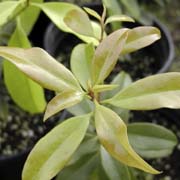
In the Garden![]()
Rick Barboza
Lama
LATIN NAME
Diospyros sandwicensis
(Hawaiian Ebony/Persimmon) Description: Small- to medium-size trees, 5 to 40 feet tall with dark brown bark and pale green foliage. New leaves, called liko, are a bright pinkish-orange and very attractive. The flowers are tiny, at about one-eighth-inch in diameter, and emerge at the leaf axis. Once pollinated, oval-shaped fruit about an inch long develop. The fruit starts off green, changes to yellow, then orange or red when ripe. Each fruit contains one to three seeds. One of this plant's most appealing features is its heartwood. As part of the ebony family, lama wood is hard and can be polished to reveal a deep, dark luster. It is a slow-growing plant, so be patient when you plant it in the ground.
Distribution: Lama is an endemic plant found predominantly in dry-mesic valleys and ridges, though it is occasionally found in the wet forest as well. They are found near sea level up to about 3,600 feet in elevation on all of the major Hawaiian islands except Niihau and Kahoolawe.
HUI KU MAOLI OLA
Cultural uses: Lama wood is used to decorate hula altars because its name is associated with enlightenment. It is also used to build houses for curing the sick, as well as for fencing to mark sacred areas.
Landscape uses and care: Lama can be a gorgeous tree if given the time to fully grow. It should be treated as a specimen plant placed to be admired. Give it a lot of sun and limit watering. A good soaking two to three times weekly should do.
The only pests that really get to this plant are scales. Keep an eye out for them, and treat it as any other tree by spraying with pesticide or by wiping, using fingers, with soapy water. These plants are hard to get right now in anything larger than a 1-gallon pot. However, they will grow faster once put into the ground.
More information: There is another species of lama (D. hillebrandii) found only on Oahu and Kauai. They are called lama or elama; either name is OK.
Rick Barboza co-owns Hui Ku Maoli Ola, a native Hawaiian plant nursery. Contact him at 259-6580 or e-mail rickckbarboza@aol.com.
Gardening Calendar


